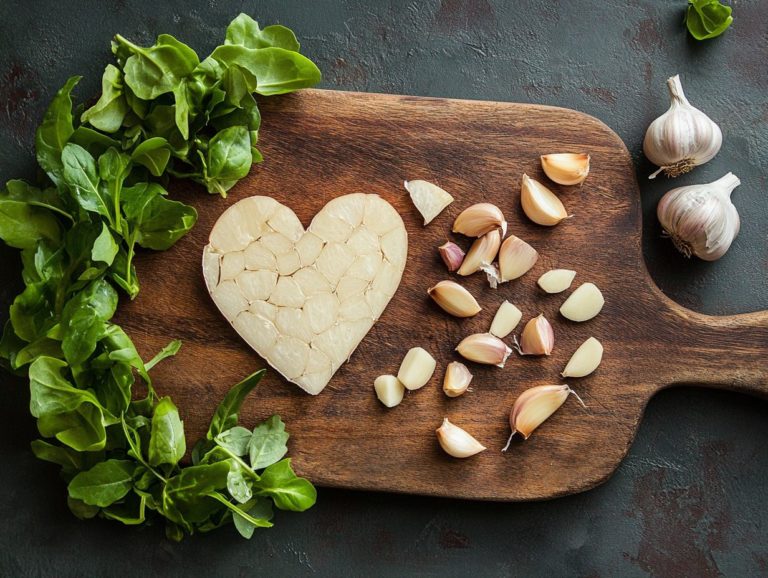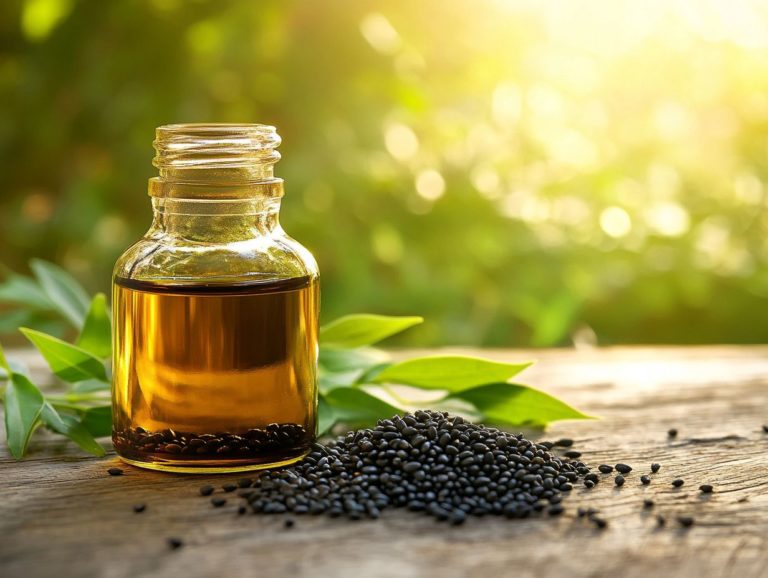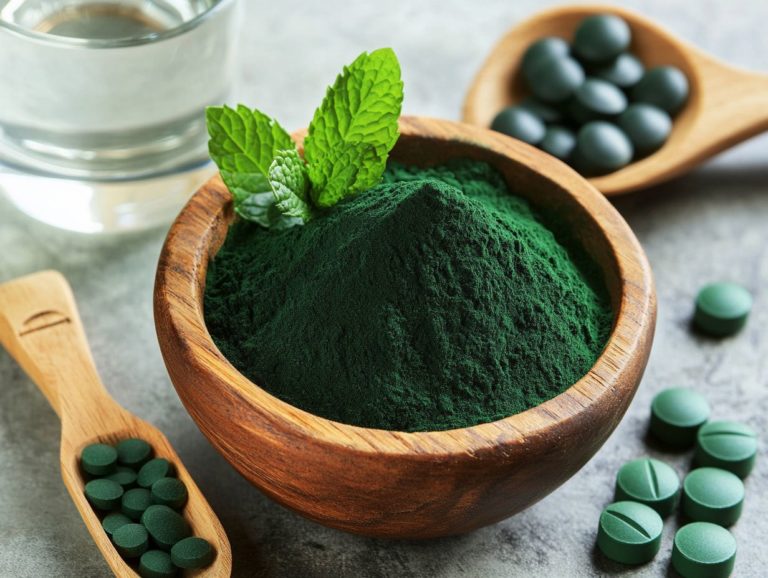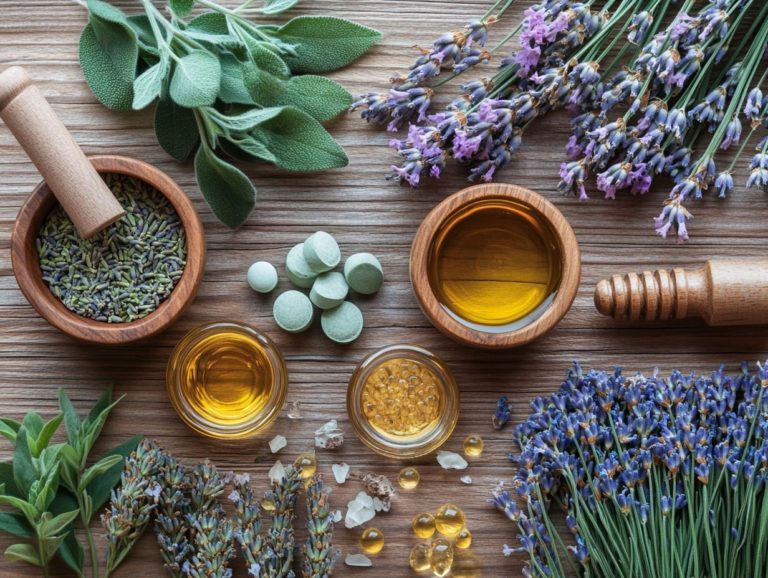The Healing Power of Turmeric: Benefits and Uses
Turmeric, often celebrated as a superfood, transcends its role as just a vibrant spice. With its striking yellow hue and distinctive flavor, this ancient root offers a plethora of health benefits that have captivated wellness enthusiasts around the globe.
From its formidable anti-inflammatory properties, which help reduce swelling and pain, to its diverse culinary and medicinal applications, turmeric is a staple that deserves a spot in your pantry and wellness routine. This spice not only enhances dishes but also acts as a powerful dietary supplement for overall health benefits.
In this article, we will explore various aspects of turmeric. You’ll learn how to incorporate it into your diet with delightful recipes, understand potential side effects, and consider turmeric interactions and necessary precautions.
Discover how this golden spice can elevate both your health and your culinary experiences!
Contents
Key Takeaways:
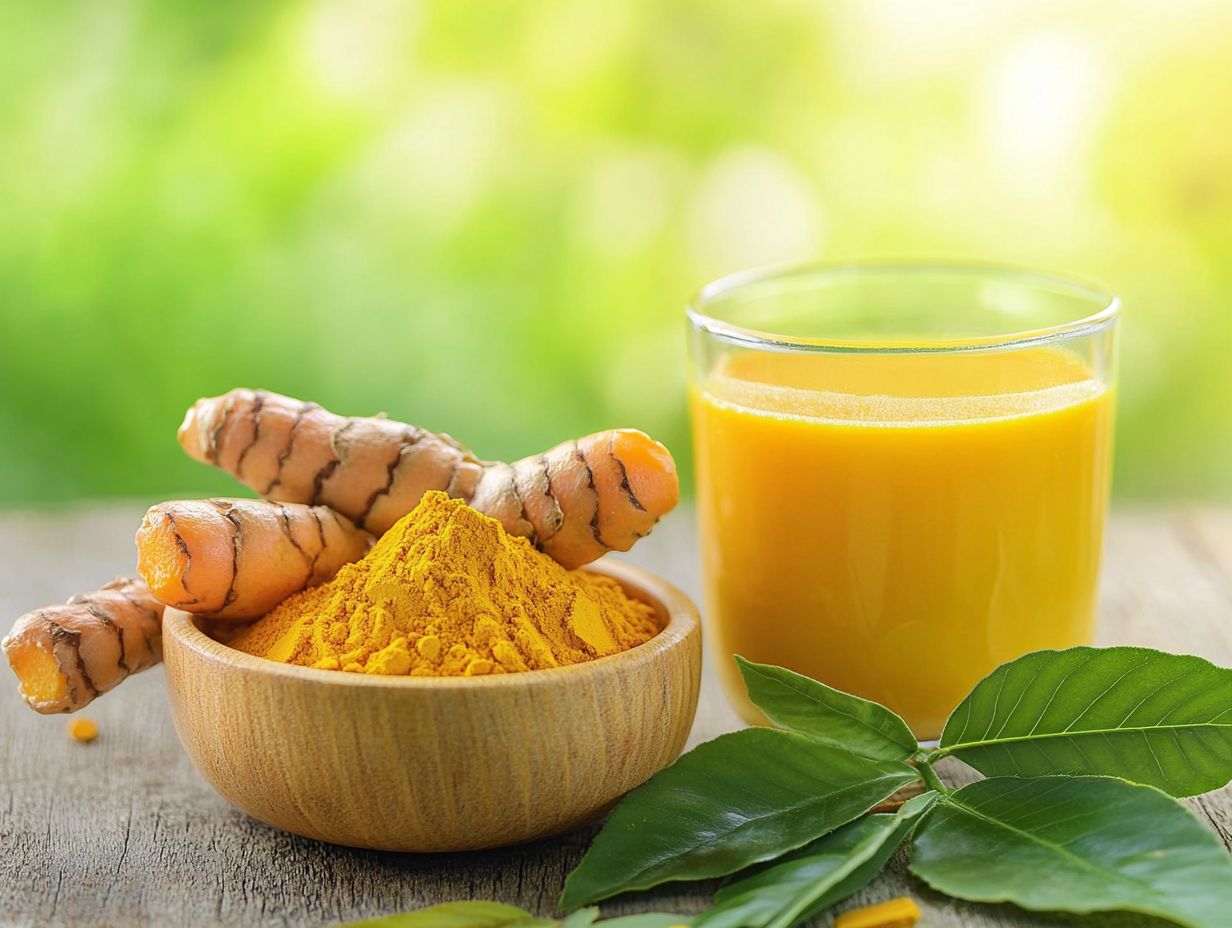
- Turmeric has powerful anti-inflammatory properties, making it a natural and effective remedy for various conditions and illnesses.
- As a potent antioxidant, turmeric can help boost the immune system and protect against free radicals that can cause damage to the body.
- Incorporating turmeric into your diet is easy and delicious, with various culinary and medicinal uses. However, caution should be taken for those on certain medications or pregnant/breastfeeding women.
Unlocking the Power of Turmeric: What You Need to Know
Turmeric, scientifically known as curcuma longa, is a vibrant yellow spice that comes from the root of the turmeric plant and belongs to the ginger family. It graces kitchens and plays a crucial role in traditional Ayurvedic medicine.
This delightful spice has gained traction for its culinary charm and impressive array of health benefits. Its active compound, curcumin, is renowned for its anti-inflammatory and antioxidant properties, aiding in the management of chronic conditions like heart disease and high cholesterol.
Primarily cultivated in South Asia, turmeric has been a beloved staple in various cuisines and natural remedies for centuries, solidifying its place as a significant herb in both culinary and medicinal realms. India and Bangladesh lead as the largest producers, thriving in warm, humid conditions that are vital for growth.
Turmeric carries deep cultural and spiritual significance. It often features in Hindu rituals and ceremonies as a symbol of purity, fertility, and health, reflecting its role in Ayurvedic medicine. Its radiant hue brightens festivals and weddings, underscoring its importance in social traditions.
In regions like Southeast Asia and the Middle East, turmeric has woven itself into traditional dishes, highlighting its versatility as both a spice and a natural healing agent. This reinforces its status as a vital component of global heritage, cherished across cultures for its myriad uses and significance.
Benefits of Turmeric
The health benefits of turmeric are extensive and multifaceted, primarily attributed to its key active compound, curcumin. This powerhouse ingredient has been the subject of numerous studies, showcasing its impressive anti-inflammatory and antioxidant properties.
Research suggests that turmeric can significantly aid in managing chronic conditions such as arthritis, heart disease, and even Alzheimer s disease. Incorporating turmeric into your health regimen is a wise choice.
Imagine a spice that not only flavors your food but also fights inflammation and boosts your immune system! Its remarkable ability to combat inflammation and neutralize free radicals elevates turmeric as a potent dietary supplement, essential for promoting your overall wellness.
Start incorporating turmeric into your meals today and experience its incredible benefits!
Anti-Inflammatory Properties
Turmeric is celebrated for its remarkable anti-inflammatory properties. This effect is primarily due to curcumin, which inhibits inflammatory enzymes and cytokines.
This makes turmeric an effective natural remedy for conditions like joint pain, osteoarthritis, and other inflammatory disorders. With turmeric, you can experience much-needed relief without the unpleasant side effects often linked to pharmaceutical anti-inflammatories.
Scientific studies have validated its ability to reduce inflammation at the molecular level. This indicates its potential as a powerful dietary supplement.
Research reveals that regularly incorporating turmeric into your diet can lead to significant improvements in symptoms associated with chronic pain and inflammation. It has been highlighted that turmeric is effective in alleviating discomfort linked with rheumatoid arthritis and inflammatory bowel disease.
Its role in pain relief extends beyond just addressing inflammation. Curcumin may affect how we feel pain. By integrating this golden spice into your meals, you not only enhance flavor but also embrace a natural approach to managing various inflammatory conditions.
Antioxidant Benefits
The antioxidant benefits of turmeric largely stem from curcumin, which is essential for neutralizing free radicals. It safeguards your body s cells from oxidative stress.
This protective role is crucial, as oxidative stress is linked to various health concerns, including cancer, heart disease, and neurodegenerative disorders like Alzheimer s disease. Incorporating turmeric into your diet can enhance your body s natural defenses against cellular damage, support gastrointestinal tract health, and promote overall well-being.
Curcumin achieves its antioxidant effects by inhibiting inflammatory pathways and modulating gene expression related to stress response. Ongoing research underscores its significance in cancer treatment, suggesting that curcumin may impede tumor growth and enhance the effectiveness of conventional therapies.
To effectively integrate curcumin into your daily nutrition, consider elevating your meals with turmeric powder. You can blend it into smoothies or enjoy it in golden milk. Opting for curcumin supplements is also an excellent choice just remember to pair them with black pepper for optimal absorption.
This simple addition amplifies antioxidant properties and contributes to a well-rounded health regimen.
Uses of Turmeric
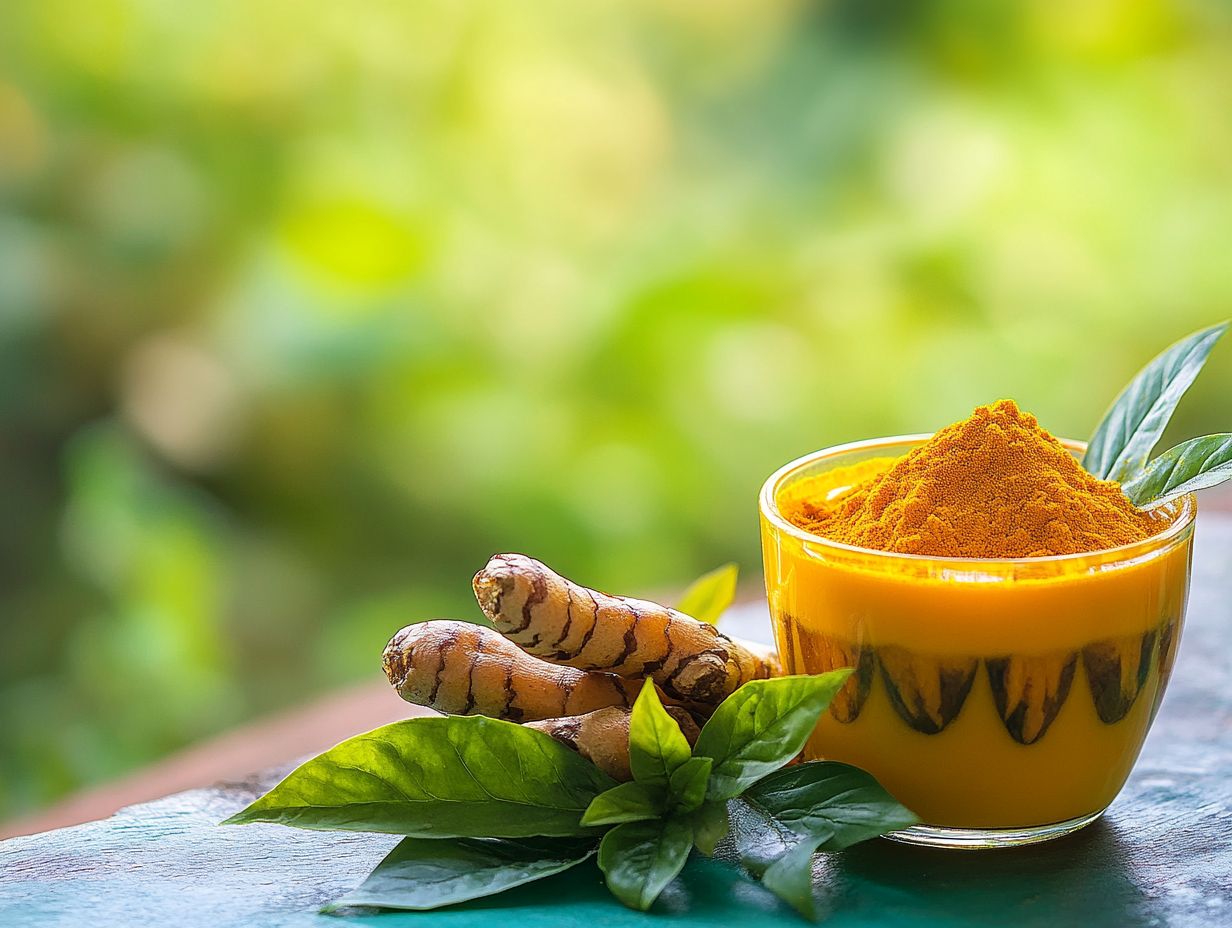
Turmeric serves an impressive range of purposes, seamlessly transitioning from a kitchen staple to a medicinal powerhouse. It showcases remarkable versatility as both a spice and a dietary supplement.
In the culinary realm, its vibrant hue and unique flavor elevate dishes like curries, soups, and rice. A soothing cup of turmeric tea or a turmeric-infused rice dish offers a delightful way to savor its benefits.
For those looking to harness its health-promoting properties, turmeric supplements often found in convenient capsule, extract, or turmeric powder forms have gained popularity. This makes it effortless to weave this potent spice into your daily routine.
Culinary Uses
Turmeric’s culinary potential is truly expansive, effortlessly transforming your dishes with its warm, earthy flavor and striking golden hue. Predominantly featured in Indian and Southeast Asian cuisines, you can easily incorporate turmeric into a variety of recipes, from curries and soups to marinades and even smoothies.
The rise in popularity of turmeric tea is no surprise; it offers a soothing beverage that not only delights the palate but also brings a wealth of health benefits tied to this extraordinary spice.
Turmeric also adds a delightful flavor to roasted vegetables, imparting a distinctive flair to your everyday meals. You can enhance its flavor by pairing it with ingredients like ginger, garlic, or citrus, making it an incredibly versatile companion in your kitchen.
If you’re feeling adventurous, consider creating a turmeric-infused rice dish or adding it to your homemade salad dressings to elevate your culinary creations. This remarkable spice also shines in the realm of baked goods imagine turmeric muffins or pancakes offering a surprising twist to your morning routine, reinforcing the versatility of turmeric in cooking.
With limitless possibilities, start incorporating this vibrant ingredient into your daily diet today for delicious and healthy results!
Medicinal Uses
The medicinal uses of turmeric hold great importance, largely due to the healing abilities of curcumin, which have been acknowledged in both traditional and modern medicine. You might have noticed how turmeric supplements have surged in popularity as a means to tackle various health concerns, including chronic conditions like arthritis, digestive disorders, and heart disease.
With these dietary supplements offering a concentrated source of curcumin, you have an accessible way to tap into turmeric’s healing powers.
A growing body of research indicates that curcumin may also aid in managing diabetes, inflammation, and even certain neurodegenerative diseases such as Alzheimer’s disease, positioning it as a versatile ally in your quest for overall health and mental clarity. Available in an array of forms capsules, powders, and teas these supplements cater to diverse preferences and lifestyles, making it easier than ever for you to weave this powerful root into your daily routine.
Scientific studies reveal that consuming curcumin alongside black pepper significantly enhances its bioavailability, which refers to how well your body can absorb and use a substance, amplifying its potential effects on health benefits. While the exploration of turmeric’s benefits continues, many individuals are already reaping positive health outcomes by integrating this golden spice into their lives.
How to Incorporate Turmeric into Your Diet
Incorporating turmeric into your diet can be a straightforward yet highly rewarding endeavor, allowing you to savor its numerous health benefits while elevating your culinary creations.
Whether you choose to sprinkle turmeric powder into your dishes, brew a soothing cup of turmeric tea, or opt for supplements, there are plenty of ways to ensure you re getting enough of this vibrant spice.
It s essential to pay attention to the proper turmeric dosage to fully harness its advantages, and remember to pair it with black pepper. This combination significantly boosts curcumin’s bioavailability, enhancing your body s ability to absorb all those beneficial properties.
Recipes and Tips
Dive into the world of turmeric recipes and tips for an exciting culinary adventure! Imagine adding turmeric to your smoothies and soups, or crafting flavorful curries and marinades; the possibilities are truly limitless.
If you’re in the mood for a soothing beverage, turmeric tea is an exceptional choice, offering a warm and comforting experience that showcases the spice’s rich flavors and health properties.
Incorporating turmeric into your everyday cooking not only elevates the taste but also promotes wellness, thanks to its impressive anti-inflammatory and antioxidant qualities.
When preparing these dishes, remember to pair turmeric with a dash of black pepper; this simple addition significantly enhances curcumin absorption, maximizing its health benefits.
Venturing into new recipes, like a vibrant turmeric-infused quinoa salad or roasted vegetables drizzled with turmeric-ginger oil, can transform your plate. Don’t shy away from experimenting with different cooking methods. Saut ing or slow-cooking allows for a deeper infusion of flavors, making every bite a nourishing and satisfying experience.
Possible Side Effects and Precautions
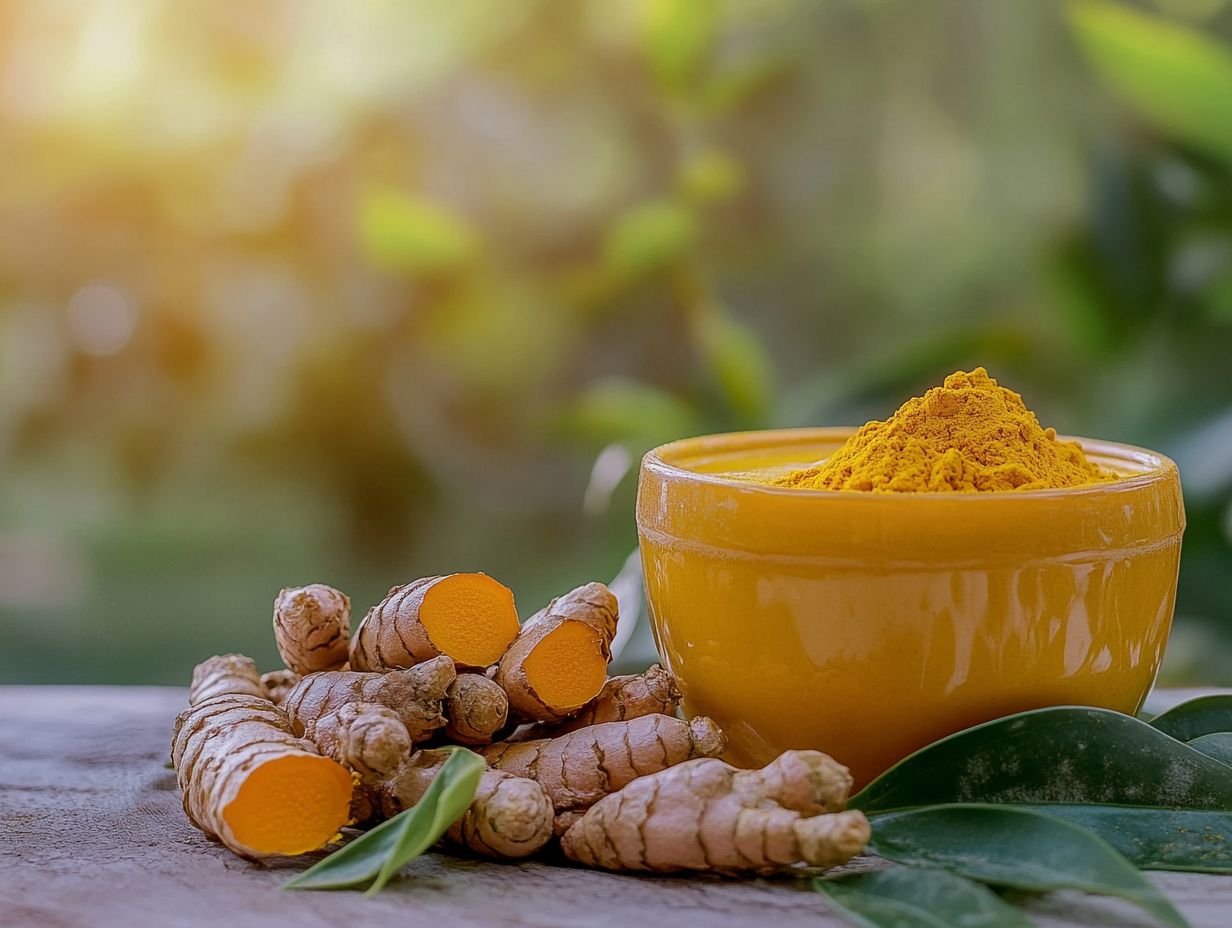
Turmeric is celebrated for its numerous health benefits. However, it’s important to consider the potential side effects and precautions associated with its use.
Some people may experience gastrointestinal discomfort or allergic reactions, especially when taking high doses or using it for a long time.
Turmeric can interact with certain medications, affecting their effectiveness. Always talk to your doctor before adding this powerful spice to your health routine!
Interactions with Medications
Turmeric can interact with medications, so be cautious if you’re undergoing treatment. The curcumin in turmeric may enhance or inhibit the effects of certain drugs, particularly blood-thinning medications and those for diabetes.
This interaction occurs because curcumin affects the enzymes that metabolize drugs. For example, if you’re on blood thinners, be vigilant as turmeric can increase the risk of bleeding.
If you’re managing blood sugar levels, note that turmeric may change your insulin sensitivity, leading to unpredictable blood sugar levels. Consult your healthcare provider about your turmeric use to tailor your treatment plan.
Pregnancy and Breastfeeding Considerations
Be cautious with turmeric during pregnancy and breastfeeding due to potential health risks. While it s safe in culinary amounts, supplements with higher doses may pose concerns.
Studies suggest excessive turmeric can cause gastrointestinal discomfort, which may be problematic during pregnancy. Consider your unique health situation and seek tailored dietary advice.
Curcumin, the active compound in turmeric, has anti-inflammatory properties but can interact with medications. Getting professional guidance is crucial to ensure the well-being of both you and your child.
Frequently Asked Questions
What is turmeric and how does it have healing power?
Turmeric is a bright yellow spice from the turmeric plant. It has been used in traditional medicine for centuries due to its healing compound called curcumin, known for its anti-inflammatory and antioxidant properties.
What are the benefits of turmeric?
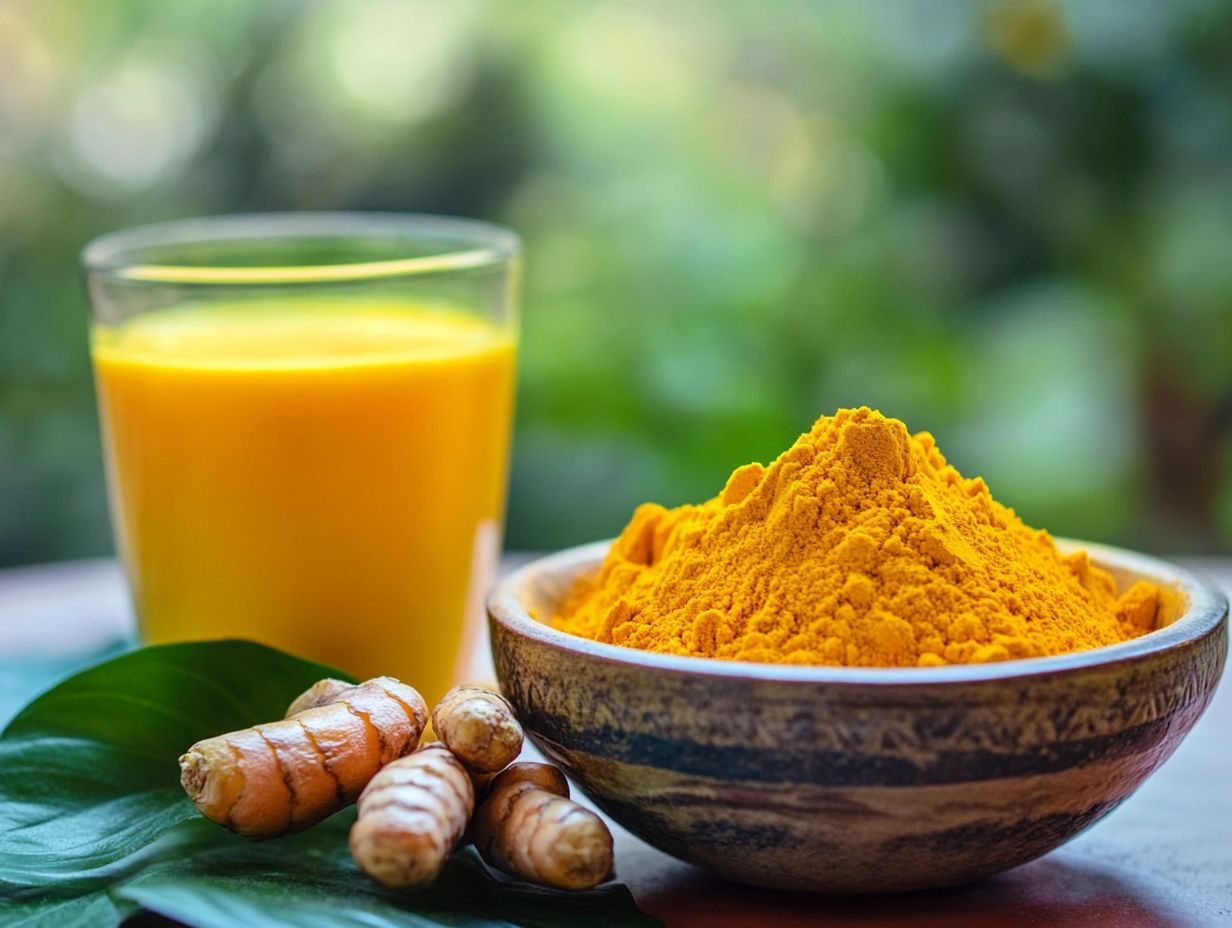
Turmeric offers various health benefits. It can help reduce inflammation, improve brain function, lower the risk of heart disease and cancer, and promote healthy skin.
It’s also used for alleviating pain and treating digestive issues.
How can turmeric be used for healing?
Turmeric can be used in many ways for its healing properties. You can consume it in food or drinks, take it as a supplement, or apply it as a paste or cream.
Each method may be more effective depending on your specific healing goal.
What conditions or ailments can turmeric help with?
Turmeric may help with arthritis, depression, diabetes, and Alzheimer s disease. It can also relieve menstrual pain, headaches, and respiratory infections.
Are there any potential side effects or interactions with turmeric?
Turmeric is generally safe in moderate amounts. However, it can interact with medications like blood thinners, and high doses might cause stomach discomfort.
Always consult a healthcare professional before adding turmeric to your routine.
How do I choose the best turmeric product for my needs?
When picking a turmeric product, look for high curcumin content and no fillers or additives. Choose products that have been third-party tested for purity and potency.
Dive into research and discover the perfect turmeric product for your health needs!


